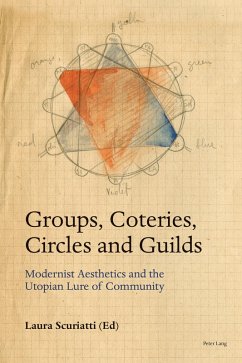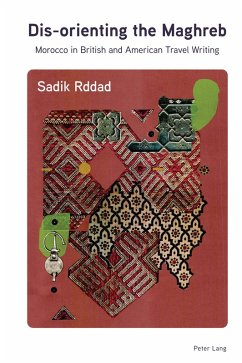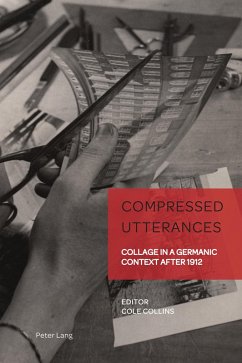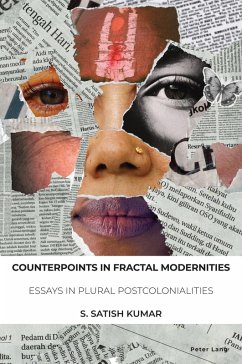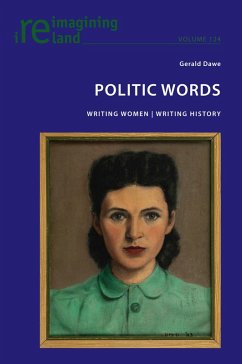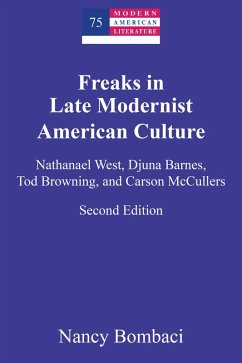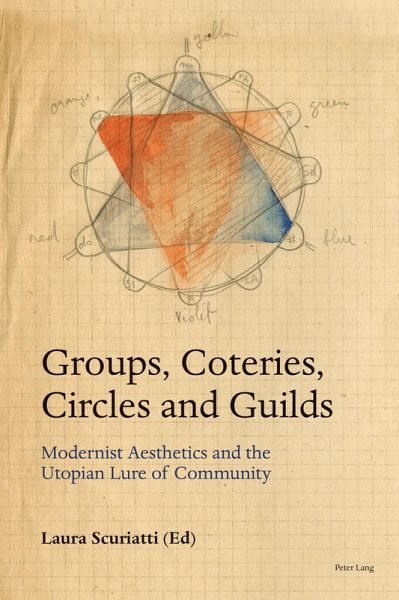
Groups, Coteries, Circles and Guilds (eBook, ePUB)
Modernist Aesthetics and the Utopian Lure of Community
Versandkostenfrei!
Sofort per Download lieferbar
Statt: 87,90 €**
70,95 €
inkl. MwSt.
**Preis der gedruckten Ausgabe (Gebundenes Buch)
Alle Infos zum eBook verschenkenWeitere Ausgaben:

PAYBACK Punkte
35 °P sammeln!
In the first half of the twentieth century, artists, intellectuals, writers, thinkers and patrons in Europe and the United States created a large number of artistic communities, circles, groups and movements with the aim of providing alternatives to the increasingly conflictual political and intellectual climate; the works and artistic practices of many of these groups were marked by an ethos of collaboration, based on a collective understanding of artistic production, and on the nurturing and exercise of sociability and conviviality. Collaboration, sociability, friendship and collective artis...
In the first half of the twentieth century, artists, intellectuals, writers, thinkers and patrons in Europe and the United States created a large number of artistic communities, circles, groups and movements with the aim of providing alternatives to the increasingly conflictual political and intellectual climate; the works and artistic practices of many of these groups were marked by an ethos of collaboration, based on a collective understanding of artistic production, and on the nurturing and exercise of sociability and conviviality. Collaboration, sociability, friendship and collective artistic efforts represented the utopian aspects of the radical experiments carried out by avant-garde and modernist artists; they were also the counterparts of the period's obsession with the notion of genius and the cult of the artist. This book offers studies of under-researched (and often consciously provincial) avant-garde and modernist groups and authors. Their progressive aims are here read as particular forms of utopia based on the ethics and aesthetics of community.
The essays in this volume analyse the significance (and failures) of literary coteries as spaces of aesthetic and political freedom. They explore the internationalist and interdisciplinary practices of the Porza Group, the abstrakten hannover and the anthroposophical group Aenigma; the utopian efforts of the artists' communities at Dornach (Switzerland) and Farley Farm, in England; the political and aesthetic implications of collaborative practices of cultural mediation, criticism and translation within the Bloomsbury group, the «Young American Critics», and of single individuals in relation to networks and avant-garde coteries, such as Mina Loy, the Baroness Elsa von Freytag-Loringhoven and Djuna Barnes. The volume offers an evaluation of the roots and ethos of sociability in the Enlightenment, as the basis of modernist utopias of community; it also reflects on the problematic notion of individual authorship within artistic groups, as in the case of the early-modernist Finnish author Algot Untola, who created around forty fictitious author-names.
The essays in this volume analyse the significance (and failures) of literary coteries as spaces of aesthetic and political freedom. They explore the internationalist and interdisciplinary practices of the Porza Group, the abstrakten hannover and the anthroposophical group Aenigma; the utopian efforts of the artists' communities at Dornach (Switzerland) and Farley Farm, in England; the political and aesthetic implications of collaborative practices of cultural mediation, criticism and translation within the Bloomsbury group, the «Young American Critics», and of single individuals in relation to networks and avant-garde coteries, such as Mina Loy, the Baroness Elsa von Freytag-Loringhoven and Djuna Barnes. The volume offers an evaluation of the roots and ethos of sociability in the Enlightenment, as the basis of modernist utopias of community; it also reflects on the problematic notion of individual authorship within artistic groups, as in the case of the early-modernist Finnish author Algot Untola, who created around forty fictitious author-names.
Dieser Download kann aus rechtlichen Gründen nur mit Rechnungsadresse in A, D ausgeliefert werden.




